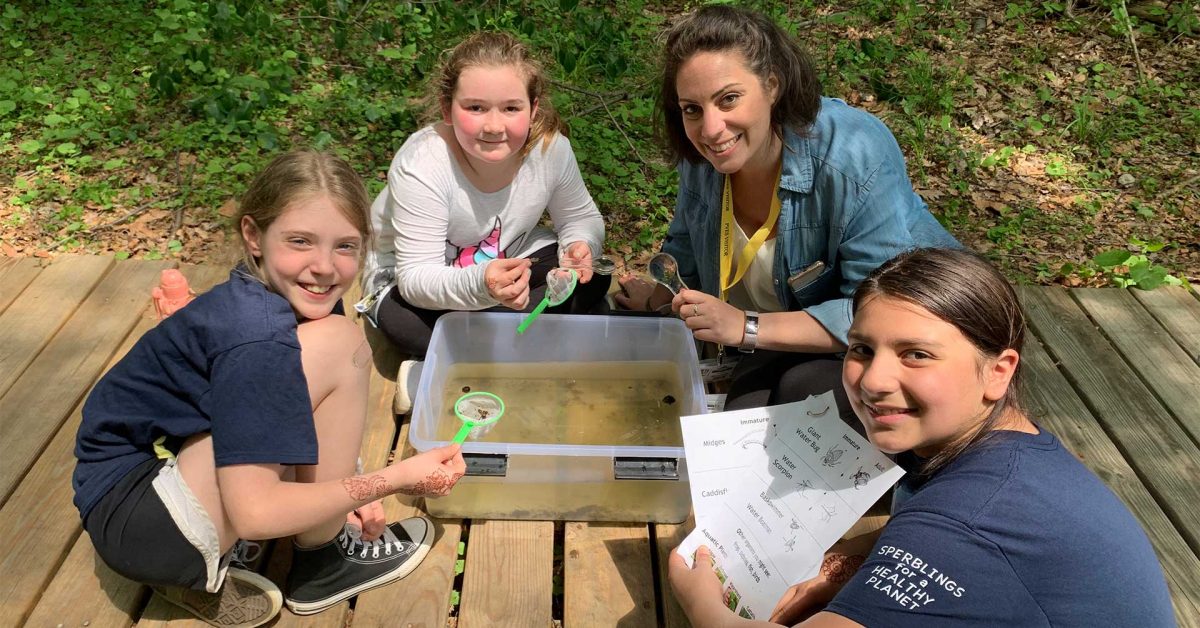Our world is rapidly changing. Education for Sustainability (EfS) challenges students to prepare for their future today while stimulating academic engagement.
Our current education system and its testing culture leads to one-size fits all teaching, with the most pressing issues of our time relegated to one single Earth Day. What if learning was connected to REAL WORLD issues and opportunities? What if kids learned math, science, ELA, history and technology both IN and OUT of the classroom? What if, as part of the core curriculum, they helped design solutions to make their communities healthier and more sustainable?
What is Education for Sustainability?
Education for Sustainability uses multiple pedagogical techniques. CELF training emphasizes project– and inquiry-based learning, place-based education and experiential learning to promote an understanding of the interconnectedness of the environment, the economy and society, and to connect that knowledge to inquiry and action.
Why is EfS important to our students? This “Q and A” approach concisely shares the goals of the modern day sustainability movement and how education for sustainability can improve education.
What does it mean to integrate EfS into my classroom? EfS can be integrated in many different ways across all content areas of K-12 education, but for a simple example, consider the humble apple. This Sustainability Rainbow chart demonstrates how an EFS lens can lead students down many paths of inquiry toward a more holistic understanding of an apple and its place in our world.
What It Is
- An education approach that uses multiple pedagogies
- Teaching through the lens of sustainability across disciplines and grade levels
- Purposeful teaching and learning that fosters a more socially just and sustainable world for our students
What It Is Not
- A curriculum
- A theme for the year
- Just a recycling program or a school garden
- Just Earth Day
Why Education for Sustainability?
The Benefits for Students
Multiple studies demonstrate improvement in student performance and well-being when schools apply EfS principles and practices. Evidence suggests that students:
- Learn to engage with and care for their local environment, both in their school buildings and in their local community.
- Find greater motivation for learning by connecting to real-world issues that matter to them.
- Develop social and emotional skills like confidence, team work, and leadership.
- Improve mental and physical health and well-being when spending time in the natural world.
- Enhance critical thinking and creative problem-solving skills through inquiry- and place-based education.
- Increased civic engagement and understanding of the ability to make a difference.
- Improve academic performance in a range of subjects.
A Selection of Research:
- Evidence of Impact of Sustainable Schools
- Environmental Literacy and Student Performance
- Summary of Stanford analysis of environmental education impact, summary of academic benefits and link to journal article
- Study on engaging middle school students in local environmental science project-based learning
- Education for Sustainable Development Improving Schools, Improving Lives
- The Benefits of Place-Based Education
- Getting Out Gets Results
- National Action Plan for Education for Sustainability
The Benefits for Teachers
In addition to enjoying improved student outcomes as described above, CELF support for integrating sustainability into K-12 curriculum can help teachers by:
- Demonstrating new and innovative pedagogical strategies that can reinvigorate enthusiasm and motivation for teaching.
- Enhancing content knowledge about sustainability issues.
- Discovering new ways to integrate community and place in lesson plans.
- Identifying academic entry points for students who are struggling or who have special needs.
- Increasing opportunities for use of STEM activities and place-based education to teach the Big Ideas of Sustainability.
- Earning in-service credits for CELF’s professional development courses per district policies as well as graduate credits for Summer Institutes.
According to the U.S. Partnership for Education for Sustainable Development, Education for Sustainability (EfS) is “the content, learning methods, and outcomes that help students develop a knowledge base about the environment, the economy, and society. [EFS] helps students learn skills, perspectives, and values that guide and motivate them to seek sustainable livelihoods, participate in a democratic society, and live in a sustainable manner.” (McMillan & Higgs, 2003)
“Education for Sustainability aspires to educate students who have the ability, ambition, and knowhow to make decisions that balance the need to preserve helathy ecosystems with the need to maintain vibrant economies and equitable social systems in this generation and in all genreations to come.”
David Sobel
Antioch University New England, Education Department
